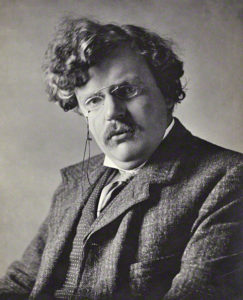G.K. Chesterton, Collected Works, Volume XXXIV

G.K. Chesterton wrote a weekly column for The Illustrated London News from the mid-1900s to the mid-1930s. Ignatius Press has assembled his essays into several volumes, as part of its massive Collected Works compilation. Despite being a century old, Chesterton’s insights are just as pertinent today as they were then — in fact, even more so.
Because Chesterton’s ideas are so important, I thought I’d share some of my favorite passages from each volume. With luck they will spark your interest in reading more. The passages below are a mere taste; Chesterton’s most engaging ideas are too involved and too amazing to be boiled down into a short excerpt.
This is a very strong volume, with a number of penetrating essays on religion, thought, art, entertainment, politics, science, history and the human condition in general. Also, there is plenty of humor and so much that is perfectly relevant for today. Get the book here.
“When such a critic says, for instance, that faith kept the world in darkness until doubt led to enlightenment, he is himself taking things on faith, things that he has never been sufficiently enlightened to doubt.” (02-13-1926)
“The difficulty is not so much to get people to follow a commandment as to get them even to follow an argument.” (03-13-1926)
“Suppose a solitary feudal gentleman could have sent his own account of the situation suddenly all over a country or a continent, in one tremendous shower of arrows or one rush of incredibly swift horsemen! That is the power of the modern Press, now almost entirely in the hands of a few wealthy private citizens.” (05-29-1926)
“We shall soon be in a world in which a man may be howled down for saying that two and two make four. …” (08-14-1926)
“Nothing of importance can be separated entirely from its social effect, which is politics, or from its ultimate value, which is religion.” (08-14-1926)
“Anything that is fashionable is on the brink of being old-fashioned.” (08-28-1926)
“In the darkness of barbarism men knew the truth without the facts. In the twilight of half-civilization, they saw the truth illuminating the facts. In the full blaze and radiance of complete civilization they found all the facts and lost the truth forever.” (09-04-1926)
“But as long as the average passenger is in the broad-minded condition so well described by Mr. Mackail, so long as he likes one thing one at one minute and another thing the next and nothing long, or for any logical reason, the big companies that control the modern State can do with the citizen exactly as they like.” (12-11-1926)
“I protest against the power of mad minorities to treat the majority as if it were another minority.” (01-01-1927)
“To scatter flowers on a grave is simply a way in which an ordinary person can express in gesture things that only a very great poet can express in words.” (01-29-1927)
“We cannot all play like Paderewski or think like Plato, but we should be a great deal nearer to it if we could forget these little tags of talk from the daily papers and the debating clubs, and start afresh, thinking for ourselves.” (02-18-1928)
“The thing that has gone out of sight — that is the thing that a wise man will always keep in his mind.” (03-03-1928)
“For that is what is meant to-day by being broadminded: living on prejudices and never looking at them.” (05-05-1928)
“When somebody wishes to wage a social war against what all normal people have regarded as a social decency, the very first thing he does is to find some artificial term that shall sound relatively decent. He has no more of the real courage that would pit vice against virtue than the ordinary advertiser has the courage to advertise ale as arsenic.” (06-30-1928)
